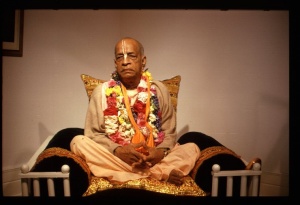SB 7.15.3: Difference between revisions
m (1 revision(s)) |
No edit summary |
||
| Line 1: | Line 1: | ||
{{info | {{info | ||
|speaker= | |speaker=Nārada Muni | ||
|listener=King | |listener=King Yudhiṣṭhira | ||
}} | }} | ||
[[Category:Srimad-Bhagavatam - Canto 07 Chapter 15|s03 ]] | |||
[[Category:Bhagavatam Verses Spoken by Narada Muni - Vanisource|071503]] | |||
<div style="float:left">'''[[Srimad-Bhagavatam]] - [[SB 7|Seventh Canto]] - [[SB 7.15: Instructions for Civilized Human Beings|Chapter 15: Instructions for Civilized Human Beings]]'''</div> | |||
<div style="float:right">[[File:Go-previous.png|link=SB 7.15.2]] '''[[SB 7.15.2]] - [[SB 7.15.4]]''' [[File:Go-next.png|link=SB 7.15.4]]</div> | |||
{{RandomImage}} | |||
==== TEXT 3 ==== | ==== TEXT 3 ==== | ||
<div | <div class="verse"> | ||
dvau daive pitṛ-kārye trīn | :dvau daive pitṛ-kārye trīn | ||
ekaikam ubhayatra vā | :ekaikam ubhayatra vā | ||
bhojayet susamṛddho 'pi | :bhojayet susamṛddho 'pi | ||
śrāddhe kuryān na vistaram | :śrāddhe kuryān na vistaram | ||
</div> | </div> | ||
| Line 17: | Line 22: | ||
==== SYNONYMS ==== | ==== SYNONYMS ==== | ||
<div | <div class="synonyms"> | ||
''dvau''—two; ''daive''—during the period when oblations are offered to the demigods; ''pitṛ-kārye''—in the śrāddha ceremony, in which oblations are offered to the forefathers; ''trīn''—three; ''eka''—one; ''ekam''—one; ''ubhayatra''—for both occasions; ''vā''—either; ''bhojayet''—one should feed; ''su-samṛddhaḥ api''—even though one is very rich; ''śrāddhe''—when offering oblations to the forefathers; ''kuryāt''—one should do; ''na''—not; ''vistaram''—very expensive arrangements. | |||
</div> | </div> | ||
| Line 24: | Line 29: | ||
==== TRANSLATION ==== | ==== TRANSLATION ==== | ||
<div | <div class="translation"> | ||
During the period for offering oblations to the demigods, one should invite only two brāhmaṇas, and while offering oblations to the forefathers, one may invite three brāhmaṇas. Or, in either case, only one brāhmaṇa will suffice. Even though one is very opulent, he should not endeavor to invite more brāhmaṇas or make various expensive arrangements on those occasions. | During the period for offering oblations to the demigods, one should invite only two brāhmaṇas, and while offering oblations to the forefathers, one may invite three brāhmaṇas. Or, in either case, only one brāhmaṇa will suffice. Even though one is very opulent, he should not endeavor to invite more brāhmaṇas or make various expensive arrangements on those occasions. | ||
</div> | </div> | ||
| Line 31: | Line 36: | ||
==== PURPORT ==== | ==== PURPORT ==== | ||
<div | <div class="purport"> | ||
As we have already mentioned, Śrīla Advaita Ācārya, during the generally observed ceremony to offer oblations to the forefathers, invited only Haridāsa Ṭhākura. Thus He followed this principle: na me'bhaktaś catur-vedī mad-bhaktaḥ śva-pacaḥ priyaḥ. The Lord says, "It is not necessary that one become very expert in Vedic knowledge before he can become My bhakta, or devotee. Even if one is born in a family of dog-eaters, he can become My devotee and be very dear to Me, in spite of having taken birth in such a family. Therefore, offerings should be given to My devotee, and whatever My devotee has offered Me should be accepted." Following this principle, one should invite a first-class brāhmaṇa or | As we have already mentioned, Śrīla Advaita Ācārya, during the generally observed ceremony to offer oblations to the forefathers, invited only Haridāsa Ṭhākura. Thus He followed this principle: ''na me'bhaktaś catur-vedī mad-bhaktaḥ śva-pacaḥ priyaḥ''. The Lord says, "It is not necessary that one become very expert in Vedic knowledge before he can become My ''bhakta'', or devotee. Even if one is born in a family of dog-eaters, he can become My devotee and be very dear to Me, in spite of having taken birth in such a family. Therefore, offerings should be given to My devotee, and whatever My devotee has offered Me should be accepted." Following this principle, one should invite a first-class ''brāhmaṇa'' or Vaiṣṇava — a realized soul — and feed him while observing the ''śrāddha'' ceremony to offer oblations to one's forefathers. | ||
</div> | </div> | ||
__NOTOC__ | |||
<div style="float:right; clear:both;">[[File:Go-previous.png|link=SB 7.15.2]] '''[[SB 7.15.2]] - [[SB 7.15.4]]''' [[File:Go-next.png|link=SB 7.15.4]]</div> | |||
__NOTOC__ | |||
__NOEDITSECTION__ | |||
Revision as of 16:04, 6 June 2021

A.C. Bhaktivedanta Swami Prabhupada
TEXT 3
- dvau daive pitṛ-kārye trīn
- ekaikam ubhayatra vā
- bhojayet susamṛddho 'pi
- śrāddhe kuryān na vistaram
SYNONYMS
dvau—two; daive—during the period when oblations are offered to the demigods; pitṛ-kārye—in the śrāddha ceremony, in which oblations are offered to the forefathers; trīn—three; eka—one; ekam—one; ubhayatra—for both occasions; vā—either; bhojayet—one should feed; su-samṛddhaḥ api—even though one is very rich; śrāddhe—when offering oblations to the forefathers; kuryāt—one should do; na—not; vistaram—very expensive arrangements.
TRANSLATION
During the period for offering oblations to the demigods, one should invite only two brāhmaṇas, and while offering oblations to the forefathers, one may invite three brāhmaṇas. Or, in either case, only one brāhmaṇa will suffice. Even though one is very opulent, he should not endeavor to invite more brāhmaṇas or make various expensive arrangements on those occasions.
PURPORT
As we have already mentioned, Śrīla Advaita Ācārya, during the generally observed ceremony to offer oblations to the forefathers, invited only Haridāsa Ṭhākura. Thus He followed this principle: na me'bhaktaś catur-vedī mad-bhaktaḥ śva-pacaḥ priyaḥ. The Lord says, "It is not necessary that one become very expert in Vedic knowledge before he can become My bhakta, or devotee. Even if one is born in a family of dog-eaters, he can become My devotee and be very dear to Me, in spite of having taken birth in such a family. Therefore, offerings should be given to My devotee, and whatever My devotee has offered Me should be accepted." Following this principle, one should invite a first-class brāhmaṇa or Vaiṣṇava — a realized soul — and feed him while observing the śrāddha ceremony to offer oblations to one's forefathers.